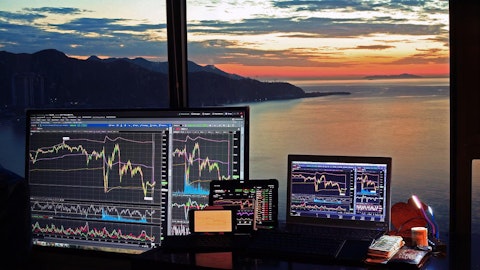Mark Hobbs: Yes, sure. Thanks, Avigal, and thanks, Neil, for the question. As I’ve mentioned on prior calls and discussions that we’ve had specifically, we’ve evaluated a myriad of options and alternatives that are available to us. And we have strong conviction around the actions we need to take and what we would like to achieve through some of the parts. And as Avigal mentioned in his prepared remarks, we’re working very hard towards those objectives. I don’t want to say anything specific, and I would love to be more specific around timing. But at this point in time, we don’t have anything that we feel that we can tell you other than our focus is on preserving our ability to perform well through the cycle or through all the steps that Avigal and others on the call have mentioned.
And the other thing that we’re really focused on is in anything we do preserving significant amount of liquidity across our business so that we can take advantage of accretive growth opportunities that we truly believe are in front of us going forward. But I would just finish with just saying, look, we are committed to extracting value across our businesses where we see opportunities to do so.
Neil Mehta: Thanks, Mark.
Operator: Our next question comes from Ryan Todd with Piper Sandler. Please go ahead.
Ryan Todd: Thanks. Maybe a question on CapEx for you, as we look into 2024. I know that you had said that from a maintenance point of view, you don’t have another major turnaround until crops in the fourth quarter of next year. Can you maybe talk about how you would think about some of the moving pieces on capital as we look into 2024 and how we should think about a run rate there in the next year?
Avigal Soreq: Yes, Ryan, thanks for the question. And Ryan, we are very disciplined about capital deployment. We’ve demonstrated over and over, both on the shareholder and debt, so that’s the puzzle we are working on this every day all day. Regarding 2024, specific to your question, I don’t want to be ahead of myself. We are still finalizing our brand for 2023 for 2024. But directionally, we are looking on a lower number than 2023.
Ryan Todd: Okay. Perfect. Thanks. And then maybe just a follow-up on your comments. Obviously, you’re in a zero net debt balance sheet position there at Delek on an unconsolidated basis. How should we think about your priorities here? You’ve been paying down debt. You’ve been buying back some shares. Is there further work on the balance sheet that you want to do? Or should we expect a shift towards an increase in share of cash flow directed towards shareholder returns or maybe high level, how are you thinking about that as we think about the coming quarters?
Avigal Soreq: Yes, absolutely, Ryan. And I will provide more kind of overview about the way we think about capital allocation. So first of all, we increased dividend five times in a row, as you can see. And our intent is to be able to maintain dividend towards cycle. So that’s pretty clear we said that many times. Regarding debt and the return to shareholder, we took a very balanced approach between the two. Obviously, when we have opportunity to give back to investor, we were not shy, we were aggressive to that, and that’s going to be the approach going forward. But we have a balanced approach, and we’re still going to do that — executing in some of the parts. It’s a top priority. We’re going to do that, and that’s going to play a big role in that equation as well. So stay tuned.
Q – Ryan Todd: Thank you.
Operator: Our next question comes from Doug Leggate with Bank of America. Please go ahead.
Q – Doug Leggate: Hi, guys. Thanks for having you on also – offer—also offer my thoughts for you guys and what Neil said earlier. I’d like to hit a housekeeping point first, if I may, which is I think Rosy mentioned the working capital move in the quarter. And I think you said better inventory management was about affected ? Is — is that — will that reverse? Or are we now looking at our Permian — a permanent downward reset in working capital?
Avigal Soreq: Hey, Doug. Good morning. I’ll let Reuven talk about working capital just a little bit.
Reuven Spiegel: Hi, Doug, so the short answer is it will not revert itself. The longer answer is that we have been working on a zero-based budget initiatives that included a few components. One of them was the cost reduction initiative and the other one was also changing our process about how we manage inventory. That process change was tested, and that’s why we did not execute on it until this quarter. But after it was tested, we executed on it or the new process this quarter, and that helped us to reduce inventory by roughly 2.5 million barrels. Now there will be some fluctuations going forward, but we’re not going to revert back to the old levels of inventory.
Q – Doug Leggate: So we can treat that additional cash flow then as permanent.
Reuven Spiegel: Most of it, yes.
Q – Doug Leggate: Okay. Thank you. My follow-up is really on the reliability improvements. And I’m wondering, I mean, obviously, one of the key things we think about is what the free cash flow capacity of the portfolio looks like at mid-cycle. And the key input to that is obviously operating cost and capital, sustaining capital costs. So I’m wondering if you can just give us some guidepost on both of those things to achieve the higher reliability what does it mean for OpEx? What does it mean for sustaining capital?
Avigal Soreq: So Doug, I will start, and I will let Reuven or Joseph chime in. On the OpEx side, you remember that when the margins were at all-time high pretty much, we started the program that cost reduction. In the beginning, no one really understood what we are — why we are doing what we are doing. But we wanted to be to have a long runway in order to do it right. We didn’t want to rush into that. And that’s obviously going to improve our cost base, both on the OpEx and the G&A on a relative basis versus what we start. Obviously, going to — always going to have a fluctuation in OpEx and GA-based upon performance and based upon electricity power and et cetera, like Joseph outlined. But that over time, make us or making us very much ready for the mid-cycle that might present itself. That’s on the — Joseph, any you want to add on that?




